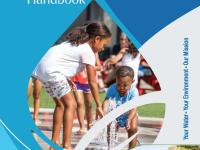Wise Water Use for Residential Customers

Update on June 23, 2025:
The Metropolitan Washington Council of Governments' (COG) Drought Coordination Committee has lifted the Drought Watch declaration in place since July 2024. This decision comes after several weeks of cooler temperatures and higher rainfall.
Although the Drought Watch is lifted, we encourage customers to practice wise water use for indoor activities—like washing clothes and dishes, showering, and brushing your teeth—and for outside uses like watering their lawns or washing their cars. Prince William Water has wise water use tips available below. If you are continuing to water your lawn, we recommend following the outdoor watering schedule below:
Odd Number Addresses: Water on Sunday, Tuesday, Friday
Even Number Addresses: Water on Monday, Thursday, Saturday
To help reduce watering demands in your neighborhood, please avoid or limit outdoor watering during the peak demand hours of 4-7 a.m.
Note that due to hydrologic conditions, western Prince William County is more susceptible to drought conditions than eastern Prince William County.
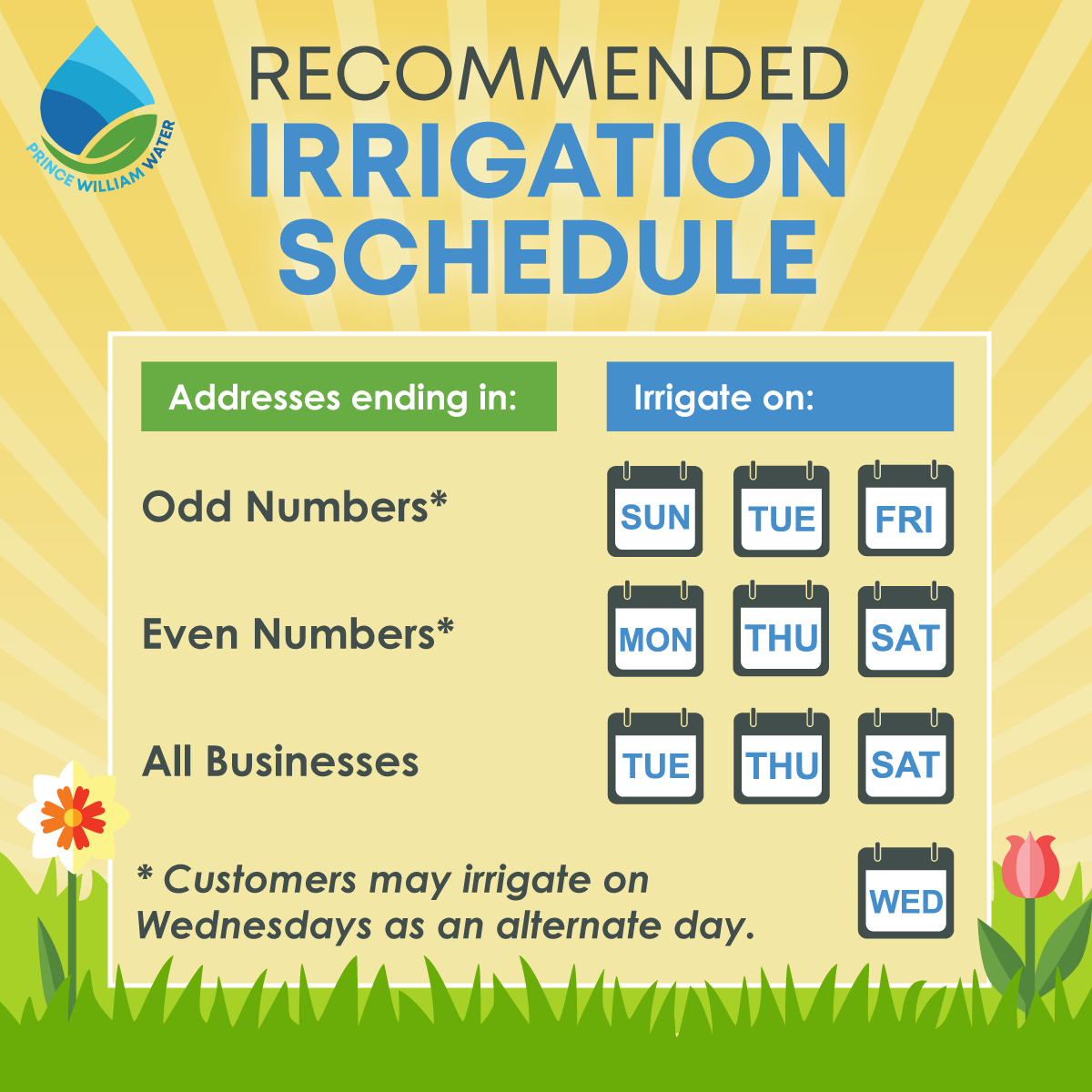
Wise Water Use Throughout Your Home
Use the following tips to help reduce your water consumption, especially during a drought.
In the Bathroom
- One of the best ways to save water inside the home is by replacing the parts inside your toilet tanks every few years. Leaking toilets can send over 1,000 gallons of water down the drain in a single day. Because they are often difficult to see or hear, toilet leaks surprise many customers in the form of an unusually high water bill. Internal toilet parts, like tires on a car, wear out over time and need to be replaced. Doing it before they begin leaking saves water and money.
- Test for toilet leaks by adding food coloring to the water tank. Don’t flush for 2 - 3 hours. If there is color in the bowl after 2 - 3 hours, you may have a leak.
- Install water saving low-flow shower heads.
- Don’t use the toilet to dispose of tissues or other trash. Every flush uses three and a half to seven gallons of water.
- When replacing fixtures, install water saving models.
- A bathtub filled half full holds about 50 gallons of water. Consider showering instead.
- Limit the length of showers to two or three minutes. An unrestricted shower head runs at five to ten gallons a minute.
- Avoid letting the water run while shaving, brushing your teeth, and washing your face.
- Teach children to turn faucets off tightly after use.
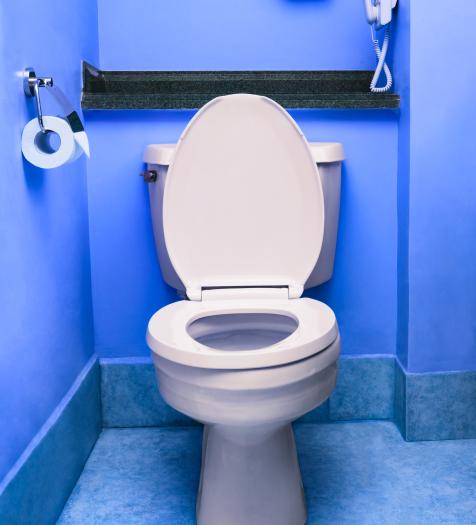
On the Lawn
- Avoid excessive watering. Most lawns need only an inch of water per week to stay healthy. Measure the amount of time it takes your sprinkler to deliver that much water, and do not exceed the total time for the week. A shallow container, such as a tuna can, can be used to measure the water.
- Use short cycles (5 minutes) at least an hour apart to reduce runoff.
- Reduce evaporation by watering in the evening or early in the morning.
- Set sprinklers carefully to avoid watering paved areas.
- Avoid sprinklers that spray a fine mist, which increases evaporation.
- Aerate the soil in the spring and fall to reduce runoff.
- Keep the grass 2-3" long to enhance root development with minimal watering.
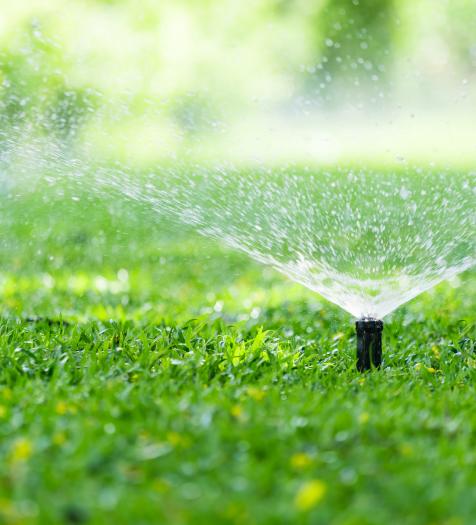
Landscape Wisely
- Minimize grassy areas, which require the most water.
- Plant water efficient grasses, plants, trees, and shrubs.
- Use mulch to help the soil retain moisture and to reduce the growth of weeds.
- Use drip irrigation to water plants, trees, and shrubs.
- Plant in the spring or fall, when watering requirements are lower.
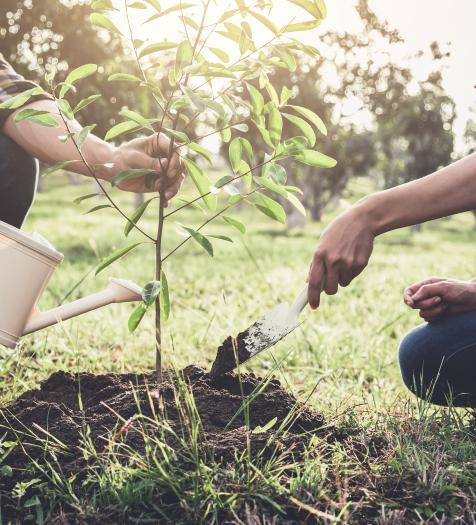
Other Outdoor Tips
- Shut off and drain the water lines to outside spigots in the winter. This prevents freezing temperatures from causing expensive leaks.
- If you have an automatic sprinkler system, inspect it regularly for leaks and malfunctioning parts.
- Avoid using the hose to clean areas that could be swept with a broom.
- When washing vehicles, run the water only to wet and rinse. Use a container to hold the water used for washing.
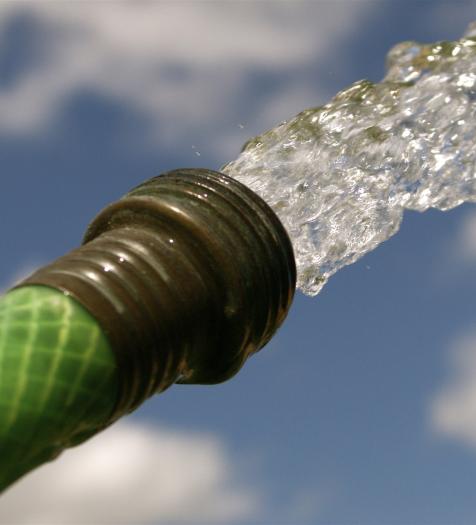
Other Resources
-
-
Don't Let Leaks Last (Environmental Protection Agency)
Water Conservation Throughout the Home (HomeAdvisor)
